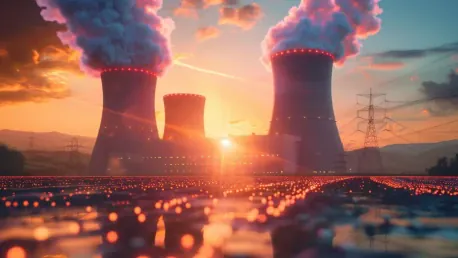The introduction of DeepSeek R1, a new artificial intelligence (AI) model from China, has sent shockwaves through the financial markets, resulting in a significant dip of 3% in the Nasdaq Composite and a fall of 1.5% in the S&P 500. Beyond affecting the stock prices of major corporations, this groundbreaking AI model presents widespread implications for various industries, particularly the energy sector. As utility companies and independent power producers explore the application of AI, it is paramount to address the associated security risks and adopt measures to ensure safe integration.
Artificial intelligence holds tremendous promise in revolutionizing the nuclear energy sector by streamlining development, operations, and maintenance tasks. However, the benefits of AI can only be realized if stringent data security, privacy, and operational integrity standards are maintained. The nuclear energy sector, in particular, must be vigilant about the potential risks that AI models such as DeepSeek R1 can introduce and take a proactive approach to mitigate them. By adhering to best practices and implementing robust protocols, the industry can harness AI’s power without compromising security.
1. Instruct Employees
Employees must comprehend the significance of protecting sensitive information when utilizing AI tools. The first step for nuclear power plants in addressing AI-related risks involves educating employees. Proper education and training programs are essential to ensure that plant operators and other staff members understand the importance of safeguarding sensitive information. Employees should be thoroughly informed about the potential risks of using AI models like DeepSeek R1, particularly in critical infrastructure environments.
Plant operators should provide explicit guidance advising against using DeepSeek R1 for work-related tasks or sharing company data with it. Clear and concise instructions should be disseminated to staff to reinforce the idea that AI tools must be handled responsibly. By offering continuous education and making employees aware of the importance of maintaining data security, the nuclear industry can establish a culture of vigilance and caution when dealing with new AI technologies.
In addition to formal training sessions, regular updates and reminders about security protocols should be issued to ensure that employees remain vigilant. Encouraging a mindset where security is always a priority—rather than an afterthought—can significantly reduce the risks associated with adopting new technological tools. Employees must be reminded that rigorous security measures are not just a bureaucratic requirement but a fundamental part of safeguarding the integrity and safety of nuclear operations.
2. Define AI Usage Policies
Organizations should create policies that specify how and when AI tools can be employed. Establishing comprehensive AI usage policies is another critical step that the nuclear industry must take. These policies should outline the specific circumstances under which AI tools like DeepSeek R1 can be used, as well as the precautions that must be followed. By defining a clear framework for AI usage, organizations can ensure that employees are aware of the boundaries and limitations associated with these technologies.
These policies should stress the importance of using vetted and approved models to ensure security. The emphasis on using only verified and secure AI models cannot be overstated. Organizations must implement a stringent vetting process to evaluate and approve AI tools before they are integrated into operations. This process must include assessing the security features, compliance with industry standards, and potential risks associated with the AI model.
To further strengthen AI usage policies, companies should establish protocols for continuous monitoring and review of AI tool performance. This ongoing assessment will allow organizations to identify and address any emerging security concerns promptly. A feedback loop where employees can report issues or concerns related to AI tool usage should also be established to ensure that policies remain relevant and effective. Regular reviews and updates to AI usage policies will help organizations stay ahead of potential threats and maintain a high level of security in their operations.
3. Assess AI Models Thoroughly
While DeepSeek R1 offers a version that can be hosted internally, any implementation should undergo a meticulous review process to confirm that it meets security and compliance standards. Thorough assessment of AI models is crucial for the nuclear industry to ensure that any new technology is safe and reliable. This assessment process should include a detailed evaluation of the AI model’s architecture, data handling practices, and potential vulnerabilities.
Organizations must conduct an internal review and, if necessary, seek external expertise to validate the security measures in place. This meticulous review process will help identify any weak points that could be exploited and ensure that the AI model aligns with the organization’s security and compliance standards. By rigorously evaluating AI models before implementation, nuclear plants can mitigate risks and prevent security breaches that could have catastrophic consequences.
Furthermore, the assessment process should involve stress testing the AI model under various scenarios to evaluate its robustness and reliability. This testing will help determine how the AI model performs under different conditions and identify any potential flaws that need to be addressed. By adopting a proactive approach to assessing AI models, nuclear power plants can build a solid foundation for integrating new technologies safely and effectively.
4. Collaborate to Establish Standards
The introduction of DeepSeek R1, a cutting-edge artificial intelligence (AI) model from China, has sent ripples through the financial world, leading to a notable 3% drop in the Nasdaq Composite and a 1.5% decline in the S&P 500. The repercussions extend beyond stock prices, impacting various sectors, particularly energy. Utility firms and independent power producers are considering AI applications, highlighting the need to address security concerns and ensure safe implementation.
AI offers significant potential to revolutionize the nuclear energy sector by improving development, operations, and maintenance processes. However, to harness these benefits, strict standards for data security, privacy, and operational integrity must be upheld. The nuclear industry, in particular, should be wary of potential risks posed by AI models like DeepSeek R1 and adopt proactive strategies to mitigate them. By following best practices and enforcing robust security protocols, the industry can leverage AI’s advantages without compromising safety and security.









